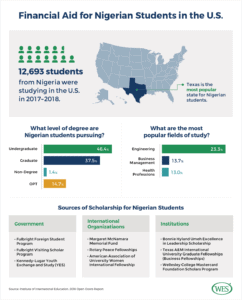Important Sources of Financial Aid for Nigerian Students
Are you a Nigerian student who is hoping to continue your education in the United States? Studying abroad is expensive, especially in the U.S. The total cost of attending a school includes accommodation, food expenses, travel costs, health insurance, textbooks, and tuition fees. But there are some ways that you can reduce your costs. First, you should look into financial aid for Nigerian students. There are some options available just for students like you! But you need to look in the right places.
Here are a few important sources that may help you fund your college education in the United States:
Your Home Country: Nigeria
Your home country may be a great source of funding for your international studies. Funds may be based on the level or field of study you are pursuing. Some scholarships grant full-tuition awards. Others give partial funds with varied benefits that may include transportation fare, a housing dividend, or a monthly stipend.
We strongly recommend absolute thoroughness when it comes to researching funding options. Researching independently will help you understand all the stipulations involved in the process and prepare backup plans. Keep in mind that several scholarship opportunities require their scholarship recipients to return to their home country upon graduation.
U.S. Organizations and Tools
Generally speaking, financial aid is more readily available to graduate students. However, some schools offer financial aid for undergraduate international students, as well.
Check out Education USA Advising Center (EAC), a website that provides unbiased information about all of the accredited higher education institutions and their financial aid options in the U.S.
The International Institute of Education has compiled a list of college and institutions that offer scholarships for Nigerian students at every level of study. There is also a tool to look for additional resources. Princeton, Harvard, and Yale are a few of the five schools nationwide that offer need-blind admission, which means that the schools cover all financial need and do not limit the amount of aid available. Need-blind admission is also offered to students regardless of their citizenship status. Students can receive a financial aid package consisting of need-based scholarships, term-time employment, and a student income contribution.
On-Campus Jobs and University Grants
Financial aid can also come in the form of on-campus jobs or university grants. As an international student on a student visa, you are not allowed to work in off-campus jobs, but some schools do offer guaranteed college employment for international students who have financial need.
Guaranteed on-campus employment means that the job is part of the financial aid package and students have an on-campus employment position confirmed before arrival. You should contact university financial aid offices to learn more about guaranteed employment opportunities. If your school does not offer guaranteed employment before arrival, ask the financial aid office about jobs that you can apply to once you are on campus.
While universities represent a noteworthy source of financial aid, private organizations in the United States also offer scholarships. MasterCard, for example, funds the MasterCard Foundation Scholars Program, a $2.2 billion, 12 year old education initiative that provides talented, yet economically disadvantaged, students from Africa with comprehensive support for secondary and university education.
Student Loans
Finally, as an international student, you may be eligible for private international student loans to study in the United States as long as you attend an approved school and have a U.S. citizen or permanent resident cosign for you.
The infographic below illustrates some of the financial aid sources available to Nigerian students:

Final Thoughts
Some colleges and universities offer numerous scholarship programs while others have very limited aid for international students. Some schools offer merit-based aid, yet others only offer need-based aid. This varies by campus, so make sure to check the financial aid and international student sections of each school’s website. Feel free to send emails with questions to the appropriate university authorities.
Though we only listed a few options, there are many more scholarship options available. For reliable information about financial aid for Nigerian students, visit the U.S Department of State website. We also recommend that you do your research online by reviewing the scholarship provider’s website for current information.
Finally, the most important tip for finding an affordable academic program is to be flexible about where you are willing to study. There are more than 4,000 colleges and universities in the U.S. and there are many smaller institutions that have reserved scholarships and grants for international students. Explore all the options, and you will be able to find an institute that can offer you a great education at an affordable price.
Related Reading




